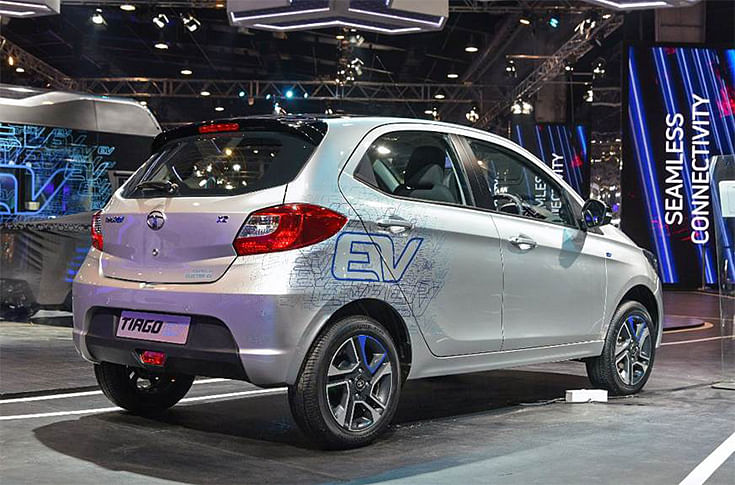Government should also incentivise personal electric vehicles: Tata Motors
Tata Motors draws up a multi-pronged strategy to develop its EV business. Plans to focus on EVs for personal use, in addition to the fleet sector. To showcase new EV concept at Geneva Motor Show next month. Commercial launch of an EV for personal use could be within two years.
In the 2019 edition of Geneva Motor Show next month, Tata Motors will showcase a concept electric vehicle (EV) "which will be closer to an exciting electric vehicle with the right (driving) range, very exciting for the private consumers, and one that will drive aspiration in the market". An 'aspirational' Tata EV could hit the market 'much shorter' than 3-4 years, possibly within two years. Along with the new concept, Tata Motors is working on a couple of EVs to be aimed at the personal vehicle space.
In a fledgling EV market, where only a handful of electric cars are sold, thanks to fleet customers or institutions, why is Tata Motors aiming for the personal vehicle space? "The primary market (for EVs) for the next 4-5 years is going to be fleet, but we want to focus on overall adoption of electrification including in the private segment. This is what we want to drive," says Shailesh Chandra, president - electric mobility business & corporate strategy, Tata Motors (pictured below), during his first media roundtable after taking up his current role.

Incentivising personal EVs could draw new buyers
Tata Motors is yet to enter the personal EV space. It has so far bagged an order for 5,050 electric Tigors from Energy Efficiency Services Limited (EESL), and 500 cars from self-drive rental company Zoomcar. It has had discussions with '50-60' fleet operators. Even though, Chandra says "government should think of incentivising personal 4-wheelers" also to drive mass-scale electric mobility.
His argument is that once a customer experiences an EV, he/she converts to electric mobility. If that is the case, incentivising electric personal cars should convert a significant base of customers who move upgrade from a 2-wheeler to a 4-wheeler every year. "It is unlikely that a personal car user will move to a bus because of the comfort factor. At best he/she may shift to shared mobility," says Chandra. He also argues that visibility of EVs only in fleets may also create an image which may be in contrast to being aspirational for the car buyer. Another argument is that 30-32 percent of pollution by transportation comes from 4-wheelers, citing a Boston Consultancy Group analysis.
With regard to subsidy, Chandra says that it is needed for 4-5 years at least. The government was expected to announce a new/additional set of incentives under the second phase of the FAME scheme, which sources say is unlikely to happen by March 31st, which is the expiry date of the current FAME scheme. "Just to maintain the (EV market) momentum it is important that the government continues the FAME I incentives, if not announce FAME 2," says Chandra.
Practicality matters for adoption of EVs
Along with the aspirational factor, practicality is also key for the adoption of EVs in India. Along with charging infrastructure and acquisition cost, 'range anxiety' has been a major hurdle for EVs. According to Chandra, "For 80 percent of the use cases, a 140km range is good. Some of the customers feel that a 200km driving range will be great."
That's what Tata Motors is working on. The new EVs it's working on may offer up to 250km driving range in a single charge. "After talking to customers and certain entities, which are voluntary groups in the electric mobility space, we have come to a conclusion that anywhere between 220-250km is an optimum range to give. Technically it's possible to give a 300-400km range, even without going for a dedicated platform. Then the price increases to the extent that it would not make sense," says Chandra, while maintaining that a 140-150km driving range is still optimum for a midsize car.

Tata Tiago EV.
Multi-pronged EV growth strategy
Tata Motors wants to be a "market maker" in the EV space, and has devised a three-pronged plan to achieve its goals. Its current strategy of converting cars with IC engines to EVs with 'optimised range, price and performance' will be joined by long-range EVs and 'aspirational' EVs with 'class-leading technologies and features'.
The company has taken a 'micro market approach' to build the business. 20-25 cities which are conducive for electric mobility (read high pollution, state government incentives, early adopters) are part of the first phase. The OEM says it will leverage partnerships and new business models to build a full EV ecosystem.
A good part of that remains within the Tata Group. Tata Motors is in discussions with Tata Consultancy Services (for data platform/battery management systems), Tata Power (charging infrastructure), Tata AIG (insurance), Tata Chemicals and Tata Autocomp Systems (for cell manufacturing, localising other components), Tata Realty and Infrastructure (operations platform), Tata Motorfinance and Tata Capital (financing).
With its multi-pronged strategy, Tata Motors wants to first focus on whatever demand there is to bring "all closer to the fence". A challenge it is for all players in the EV space, but if electric mobility is the future then there's no option but to go all out to achieve that critical scale.
RELATED ARTICLES
Cosmo First diversifies into paint protection film and ceramic coatings
The Aurangabad, Maharashtra-based packaging materials supplier is leveraging its competencies in plastic films and speci...
JSW MG Motor India confident of selling 1,000 M9 electric MPVs in first year
The 5.2-metre-long, seven-seater luxury electric MPV, which will be locally assembled at the Halol plant in Gujarat, wil...
Modern Automotives targets 25% CAGR in forged components by FY2031, diversifies into e-3Ws
The Tier-1 component supplier of forged components such as connecting rods, crankshafts, tie-rods, and fork bridges to l...






 19 Feb 2019
19 Feb 2019
 8790 Views
8790 Views





 Autocar Professional Bureau
Autocar Professional Bureau




